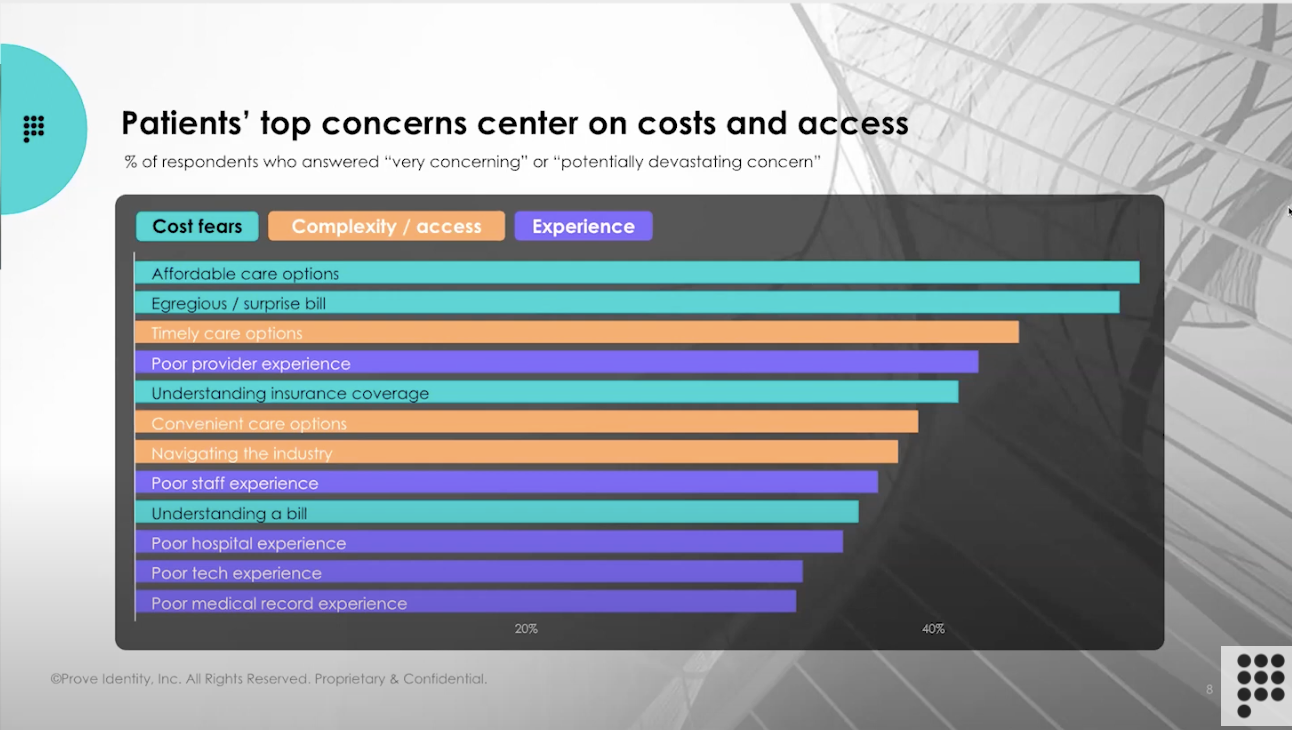How Healthcare Leaders Can Build a Digital Front Door Using Phone-Centric Identity

In a recent webinar, Prove’s VP of Healthcare Mike Bechtel, and Dr. Aasim Saeed, the founder & CEO of amenity.health, discussed the key trends impacting patient loyalty in 2022 and what steps healthcare executives can take to build digital front doors for their organizations.
Read the following executive summary for Mike and Dr. Saeed’s top tips for healthcare leaders or scroll to the bottom for the webinar recording.
(The following has been edited for clarity and brevity)
What’s going on in the healthcare industry today?
Dr. Aasim Saeed: We are living in a world where telemedicine is here to stay. It won’t take over 100% of care but we are seeing numbers as high as 20% as pretty standard. Numbers like this tell us that patients need to be reengaged and unless we are up for the challenge of meeting customers where they are and eliminating as much friction as possible, there will be a deficit created by COVID that will last for years. We need to bring these folks back into the healthcare industry.
What are the consumer and patient pain points that we need to fix in order to bring more folks back into the healthcare industry?
Dr. Aasim Saeed: Technology for technology's sake is just going to complicate things and add more layers to this already complex system. We need to look at the pain points that are actually impacting patients.
At amenity.health, we run surveys regularly. We asked 600 patients “what are your top concerns in healthcare?” The results show that concerns over cost are paramount. The second concern is the complexity of accessing healthcare. Lastly, the healthcare industry is not doing a good enough job with experience. Whether your doctor is 90 minutes late and doesn’t even apologize or you’re being asked to fill out a form three times, we are not having great experiences in healthcare.

Why are many digital health platforms falling short?
Dr. Aasim Saeed: In the new era of telemedicine, we need to provide fast, easy-to-use digital encounters as well as great physical encounters. Ask yourself what is the first digital encounter that many patients ever experience? In much of the United States, the answer is Epic’s MyChart. First, the patient is asked for a registration code that expires very quickly. Second, if the patient can’t find the code, there is a “don’t have an activation code?” button. Unfortunately, when you do that you encounter an Experian credit check. After that, without fail, most apps don’t even let you book an appointment.
Is there a better way to onboard new customers?
Mike Bechtel: With Prove Pre-Fill® we start with the information the patient already knows– their phone number. By checking three things– the possession of the device, the reputation of that phone number, and the ownership of the phone number, Prove can pre-populate data including address, phone number, and even social security number. With this flow, pass rates, the rate at which an individual successfully pass through this process, are generally around 90%.
Watch the full webinar on demand here.
To learn more about Prove’s identity solutions and how to accelerate revenue while mitigating fraud, schedule a demo today.

Keep reading
 Read the article: Why Prove Matters When Identity Data Leaks Become Critical Infrastructure Failures
Read the article: Why Prove Matters When Identity Data Leaks Become Critical Infrastructure FailuresAs large-scale data breaches expose billions of identity records, traditional identity verification and KYC models fail under automated fraud, making cryptographically anchored, persistent digital identity critical infrastructure.
 Read the article: How Prove’s Global Fraud Policy Stops Phone-Based Fraud Others Miss
Read the article: How Prove’s Global Fraud Policy Stops Phone-Based Fraud Others MissLearn how Prove’s Global Fraud Policy (GFP) uses an adaptive, always-on engine to detect modern phone-based threats like recycled number fraud and eSIM abuse. Discover how organizations can secure account openings and recoveries without increasing user friction.
 Read the article: Prove Supports Safer Internet Day: Championing a Safer, More Trustworthy Digital World
Read the article: Prove Supports Safer Internet Day: Championing a Safer, More Trustworthy Digital WorldProve proudly supports the goals and initiatives behind Safer Internet Day, a worldwide effort that brings together individuals, organizations, educators, governments, and businesses to promote the safe and positive use of digital technology for all, especially young people and vulnerable users.













